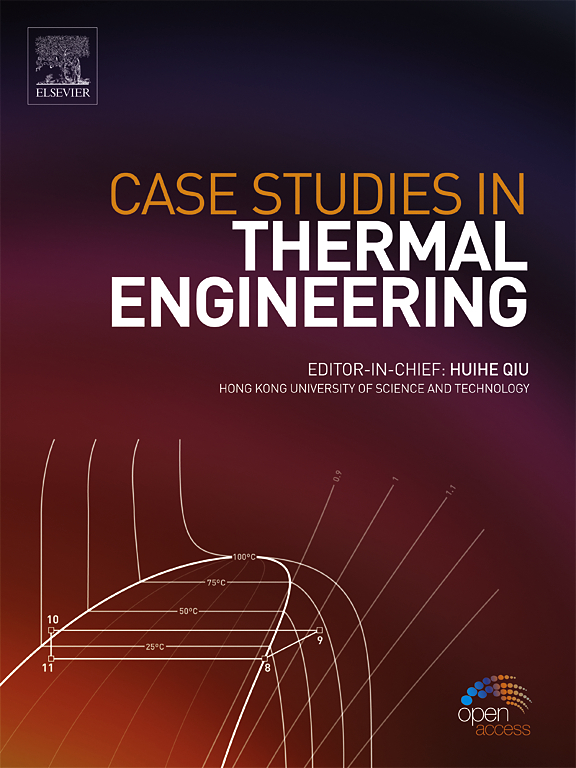New application of a calorimetric sensor: Measurement of the heat capacity of heat-conducting small parts
IF 6.4
2区 工程技术
Q1 THERMODYNAMICS
引用次数: 0
Abstract
This study explores a novel application of a calorimetric sensor to measure the heat capacity of small heat-conducting parts under varying environmental conditions. The sensor, a hybrid of a heat conduction calorimeter and a differential scanning calorimeter (DSC), has been adapted from its original use on living skin to measure conductive materials. We present a detailed description of the sensor's instrumentation, its operating model, and the experimental procedure. The sensor's accuracy is evaluated through experimental measurements on aluminum and brass samples, showing a maximum deviation of 5 % and a mean deviation of 2.35 % from the theoretical values. Additionally, finite element method (FEM) simulations are employed to further investigate the sensor's performance, confirming that both measurement time and sample size significantly influence the results. This research demonstrates the potential of this calorimetric sensor for rapid and accurate thermal analysis of small heat conducting parts, with potential applications in various scientific and industrial fields.
热量测定传感器的新应用:测量导热小部件的热容量
本研究探索了热量计传感器在不同环境条件下测量小型导热部件热容量的新应用。该传感器是热传导量热仪和差示扫描量热仪(DSC)的混合体,从最初用于测量导电材料的活体皮肤改装而来。我们详细介绍了传感器的仪器设备、运行模式和实验过程。通过对铝和黄铜样品的实验测量评估了传感器的准确性,结果显示与理论值的最大偏差为 5%,平均偏差为 2.35%。此外,还采用有限元法 (FEM) 模拟进一步研究了传感器的性能,证实测量时间和样品大小对结果有显著影响。这项研究表明,这种热量测定传感器具有对小型导热部件进行快速、准确热分析的潜力,有望应用于各种科学和工业领域。
本文章由计算机程序翻译,如有差异,请以英文原文为准。
求助全文
约1分钟内获得全文
求助全文
来源期刊

Case Studies in Thermal Engineering
Chemical Engineering-Fluid Flow and Transfer Processes
CiteScore
8.60
自引率
11.80%
发文量
812
审稿时长
76 days
期刊介绍:
Case Studies in Thermal Engineering provides a forum for the rapid publication of short, structured Case Studies in Thermal Engineering and related Short Communications. It provides an essential compendium of case studies for researchers and practitioners in the field of thermal engineering and others who are interested in aspects of thermal engineering cases that could affect other engineering processes. The journal not only publishes new and novel case studies, but also provides a forum for the publication of high quality descriptions of classic thermal engineering problems. The scope of the journal includes case studies of thermal engineering problems in components, devices and systems using existing experimental and numerical techniques in the areas of mechanical, aerospace, chemical, medical, thermal management for electronics, heat exchangers, regeneration, solar thermal energy, thermal storage, building energy conservation, and power generation. Case studies of thermal problems in other areas will also be considered.
 求助内容:
求助内容: 应助结果提醒方式:
应助结果提醒方式:


